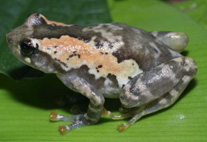Abstract
The present paper revises all species that have been assigned to Pseudopomatias Möllendorff, 1885 and Nodopomatias Gude, 1921. The following new species are described: Pseudopomatias abletti Páll-Gergely, n. sp. (northeastern India), Pseudopomatias harli Páll-Gergely, n. sp. (northeastern India), Pseudopomatias linanprietoae Páll-Gergely n. sp. (Laos), Pseudopomatias maasseni Páll-Gergely & Hunyadi, n. sp. (Vietnam and China), Pseudopomatias nitens Páll-Gergely n. sp. (Vietnam), Pseudopomatias prestoni Páll-Gergely, n. sp. (northeastern India), Pseudopomatias reischuetzi Páll-Ger-gely, n. sp. (north-eastern India), Pseudopomatias shanensis Páll-Gergely n. sp. (Myanmar) and Pseudopomatias sophiae Páll-Gergely, n. sp. (Vietnam). Pseudopomatias fulvus is moved to the synonymy of P. amoenus. Csomapupa n. gen. is erected for Pseudopomatias grandis and P. luyorensis. Another new genus, Vargapupa is erected with two species, namely Vargapupa biheli Páll-Gergely, n. sp. (Vietnam) and V. oharai Páll-Gergely, n. sp. (Laos). Both new genera are probably closely related to Pseudopomatias and Nodopomatias. All the currently available type specimens of species in these groups are figured. Anatomical information of P. eos and DNA sequence data of two Pseudopomatias species indicate that the genus is a member of the family Pupinidae. The other pre-existing hypothesis, namely that Pseudopomatias is a member of the Cochlostomatidae, is not supported by our results.

